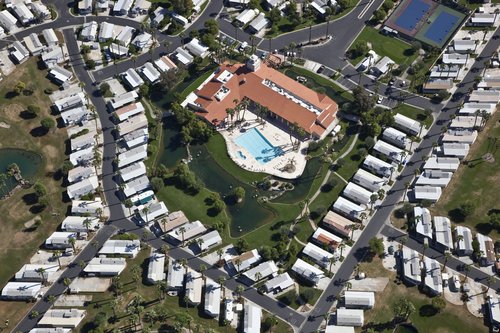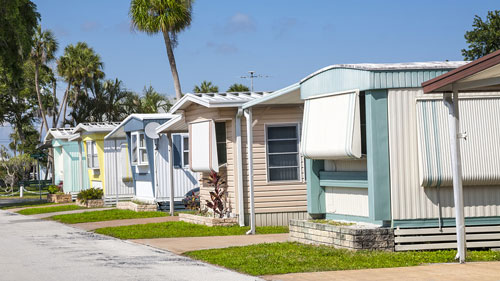Mobile Home Park Law
 Representing Florida Manufactured Housing Communities
Representing Florida Manufactured Housing Communities
and Mobile Home Parks in Disputes and Evictions
Mantoni Legal is a proud member of the Florida Manufactured Housing Association and has significant experience representing mobile home park owners in eviction proceedings and related MHP matters throughout the state of Florida. Our unique experience and resources in the manufactured housing industry allows us to adequately and cost-effectively handle evictions resulting from rules violations or non-payment of rent under Chpt. 83, Fla. Stat. (community owned homes) or Chpt. 723, Fla. Stat. (resident owned homes).
Evictions
Evictions (for Rent and Rules Violations)
Structure Enforceable Settlement Arrangements for delinquent or Rule violating Tenants
Rent Demands
Notices to Vacate for Rules and Regulations Violations
Notices to Cure for Rules and Regulations Violations
Cease and Desist Letters
Forbearance/Settlement Agreements
Handle Security Deposit disputes
Counseling Landlord / Property Managers about Rights and Responsibilities and Maintenance or Repair Obligations
Title Work
Transfer title to the Manufactured / Mobile Home into the Park Owner’s name
Handle Lien foreclosures to obtain clear Title to the Manufactured / Mobile Home
Disposition of Abandoned Personal Property
Document Preparation
Prospectus preparation
Lot Rental Agreements and other Lease Agreements (Leases with Option to Purchase)
Prepare Pre-Litigation and/or Post-Litigation Settlement Agreements
Fair Housing Act / Code Violations
Answer questions and take appropriate action for Fair Housing Act violations
Address issues related to Emotional Support Animals or caregivers
Facilitate compliance with Code Enforcement issues
Benefits
Mantoni Legal offers unbeatable volume pricing for multi-unit communities including regularly scheduled eviction updates and no charge for most client communications. Our cost to performance is unequaled in the field of Florida Mobile Home Evictions.
Other Benefits Include:
- Flat Fee Uncontested Evictions
- No Attorney Fees for Processing Title Work to the Manufactured / Mobile Home Post-Eviction
- Experience Representing Landlords and handling Evictions throughout Florida
- No Charge for In-State Travel
- No Coverage Counsel
- Reduced Fee or No Charge for Many Client Communications
- Volume Pricing for Multi-Unit Communities
- Personalized Representation
- Reduced Fee Arrangement for Evictions

With our systemized approach to Manufactured Housing / Mobile Home Park representation, to include offering modernized and better fee arrangements, regular case updates, and direct attorney contact, we eliminate many problems that plague Manufactured Housing and Mobile Home Park ownership and management.
Chapter 723 Eviction Information
Instructions: Evictions for Non-payment
Step-by-step process of uncontested mobile home park evictions for non-payment of lot rent under chapter 723, Florida statute (Tenant-owned mobile homes)
Step 1 – Non-Payment of Lot Rent
Tenant fails to pay lot rent.
Step 2 – Intake
Community Owner, Landlord or Property Manager fills out a Mantoni Legal Intake Form. The Intake Form is specifically designed for mobile home park evictions – prepared for and provided by Mantoni Legal.
*Email jlm@mantonilegal.com to request an Intake Form
Step 3 – Rent Demand
Mantoni Legal reviews the Intake Form and supporting documentation and prepares the Rent Demand.
Step 4 – Rent Demand Time-Frame
Mantoni Legal emails the Rent Demand to the Community Manager, Landlord or Property Owner to post on the mobile / manufactured home. The same day as posting, Mantoni Legal mails the Rent Demand via regular and certified mail, return receipt requested, to the home.
*Practice Pointer: The Rent Demand must be posted and mailed on the same day.
Step 5 – No Payment Within Demand Time-Frame
After the time period allowed in the Rent Demand Letter expires, (meaning the statutory time period for payment has run), Mantoni Legal will follow up with the Property Manager or Park Owner to confirm whether or not payment was made and whether the Manufactured Housing Community wants to proceed.
Step 6 – Mobile Home Park Approves Preparation of Eviction Lawsuit
After receiving confirmation from the Community that no payment was made, and to proceed with the eviction, Mantoni Legal prepares the lawsuit for eviction. At this time, Mantoni Legal will also conduct a title search to determine actual/record ownership of the manufactured home and whether a lienholder exists. If a lienholder exists, Mantoni Legal will prepare and send a statutory notice of storage charges.
*Practice Pointer: The lawsuit for eviction can be a one count complaint, for tenant eviction only, or a two count complaint for eviction and money damages for unpaid rent. There are benefits and detriments to both, as can be explained by Mantoni Legal.
Step 7 – File Eviction Lawsuit
Mantoni Legal prepares and electronically files with the court, in the county in which the property is located, the complaint / lawsuit for eviction and the summons(es). The clerk will issue the summons(es), and Mantoni Legal will send them to the process server for service on the defendant(s). Once the issued summons(es) are received, Mantoni Legal will prepare the complaint packet, along with an instructional letter to the process server for service.
*Practice Pointer: Waiting on the Clerk to issue the summons(es) can cause delay (some jurisdictions are quicker than others).
Step 8 – Service of Process (Serving The Defendant(s))
The process server attempts to personally serve the defendant(s). If the defendant(s) cannot be located after at least 2 attempts, made no less than 6 hours apart the process server can serve the defendants by posting the summons and complaint on the home.
Step 9 – Defendant(s) Served
Once served, the process server forwards a Return of Service to Mantoni Legal, which is then reviewed to ensure service was properly made and, if so, file the Return with the Court and document the defendant(s) response date.
Step 10 – Response Time-Frame
In a complaint for eviction only, the defendant(s) have 5 days to respond (not including the day of service, Saturdays, Sundays, or any legal holiday).
Step 11 – No Response
After the defendant’s response date/deadline has passed, and no response was filed with the court (Mantoni Legal verifies this by accessing the online court docket), Mantoni Legal prepares a Motion for Clerk’s Default, a proposed Clerk’s Default, and electronically files all with the court.
Step 12 – Clerk’s Default
Upon receipt of the Default package prepared by Mantoni Legal, and upon verifying that the defendant failed to file a response with the court within the time allowed for by law, the Clerk will enter Default against the defendant(s).
*Practice Note: The time it takes for the Clerk to enter the default will vary by case and by county. Waiting on the Clerk to enter the default is a potential cause for delay, due to heavy caseloads handled by the Courts. Some jurisdictions are slower than others.
Step 13 – Final Judgment
Upon entry of the Clerk’s Default, Mantoni Legal prepares and electronically files a Motion for Default Final Judgment, a proposed Final Judgment for eviction, an Affidavit in Proof of Claim, and a detailed letter to the Judge requesting that the Final Judgment be granted without a hearing.
*Practice Pointer: Every Judge has individualized requirements for preparation, receipt, and transmission of the Final Judgment.
*Practice Note: Waiting on the Judge to read the Motion for Default Final Judgment and enter the Final Judgment is the most common cause of delay. The Court docket is constantly checked to ensure that Mantoni Legal is aware as soon as the Judgment is entered.
Step 14 – Clerk Issues Writ of Possession
Under Chapter 723, Florida Statute, the Writ of Possession shall not issue earlier than 10 days from the date judgment is granted. Accordingly, 10 days after the Final Judgment is entered by the Judge, Mantoni Legal prepares and electronically files the Writ with the Court. The Writ will be issued by the Clerk and returned to Mantoni Legal.
Step 15 – Writ is Sent to the Sheriff’s Office
Once the Writ is returned, Mantoni Legal will forward the Writ of Possession to the appropriate Sheriff’s office, along with a check for execution, for service on the defendant(s). Once the Sheriff receives the Writ and check, the Sheriff will coordinate with the Community Manager for execution.
*Practice Note: The Sheriff’s office must receive, process, and assign the Writ to a deputy for execution. It is important for the Community Representative to remain polite, stay accessible, and coordinate with the Sheriff’s office.
Step 16 – Writ Execution
When the Wit is executed, the Sheriff will remove all persons subject to the eviction from the home and lot. Advise Mantoni Legal of the date/time for execution. Mantoni Legal will remain available to the Community throughout this process.
Eviction Process
Mobile Home Park Evictions
Chpt 723 (Tenant Owned Homes)
Step 1
File Complaint for Eviction (Tenant Removal Only)
Potential Cause for Delay: Mantoni Legal will file the Complaint for tenant eviction the same day confirmation from the park to proceed is received; do not delay in advising Mantoni Legal to proceed.
Step 2
Receive issued Summons(es) from Clerk
Potential Cause for Delay: Some counties issue the summons the same day as filing, others take at least 72 hours, or longer.
Step 3
Service of Process (Serve the Defendant(s))
Potential Cause for Delay: If the defendant(s) cannot be found, service can occur by posting on the home, after at least two attempts, no less than 6 hours apart.
Step 4
Defendants have 5 days to respond to the Complaint after Service
Potential Cause for Delay: The 5 days does not include Saturdays, Sundays, or any legal holiday.
Step 5
After the 5 days run, apply for a Clerk’s Default
Potential Cause for Delay: Some counties/clerks issue the default quicker than others.
Step 6
Once the Clerk’s Default is entered, apply for Final Judgment
Potential Cause for Delay: The most common cause for delay is waiting for the Judge to review and enter the Final Judgment, due to their heavy caseloads.
Step 7
After Judgment is entered, apply for the Writ of Possession
Potential Cause for Delay: There is a mandatory, statutorily imposed 10 day waiting period after Judgment is entered before applying for the Writ of Possession in 723 evictions.
Step 8
Sheriff’s Office receives, processes, and executes the Writ of Possession
Potential Cause for Delay: Some sheriff’s offices are busier than others, which affects the timeliness of execution.
Note: Title transfer to the manufactured home through the abandoned property process is a completely separate process, independent of the eviction action.
Do's & Don'ts
Do
- Properly calculate the 5 day time-frame for the tenant(s) to respond to the demand notice
- Send the rent demand via certified (or registered) mail, return receipt requested and via posting on the home
- Identify the methods of delivery on the demand
- Verify that the amount demanded is consistent with the tenant ledger
- Mail and post the demand on the same date of the demand
- Include the name and phone number of the landlord and method of payment
- Complete a Certificate of Posting for the demand notice (provided by Mantoni Legal)
- Address the Demand to anyone with an ownership interest in the home
Do Not:
- Accept partial payments after the demand is sent
- Send a rent demand to an “unknown occupant”
- Send a rent demand to a tenant you know to be in bankruptcy
- Demand or accept rent from someone who is being evicted
- Include Saturdays, Sundays or any legal holidays in the 5 day demand time-frame

Chapter 723 FAQ’s
What is Chapter 723, Florida Statute?
Chapter 723, Florida Statute, is called the “Florida Mobile Home Act” and governs any residential tenancy in which a mobile home is placed upon a leased or rented lot in a mobile home park, in which 10 or more lots are offered for rent or lease. See §723.002(1), Fla. Stat. Chapter 723 regulates important issues, such as the manner and method of preparing and delivering a rent demand, the instances in which a tenant may be evicted, and the proper procedures for filing an eviction action, to name a few.
Does Chapter 723 apply to my park?
Florida Chapter 723 governs any residential tenancy in which a mobile home is placed upon a leased or rented lot in a mobile home park in which 10 or more lots are offered for rent or lease. See §723.002(1), Fla. Stat.
Can I evict a tenant for failure to pay the lot rent?
Yes. Evicting a mobile home owner or tenant for failing to pay lot rent starts with sending a written notice demanding payment of the lot rental amount. If the default in payment continues for 5 days after delivery of the notice, the park owner may terminate the tenancy and file for eviction in the county court where the property is located. The demand notice must be in writing, posted on the premises, sent by certified or registered mail, return receipt requested, and addressed to the mobile home owner and tenant or occupant, as appropriate, at her or his last known address. See §723.061(4), Fla. Stat.
What is the time frame to evict a tenant for failure to pay lot rent?
In a standard, uncontested eviction under Chapter 723, Fla. Stat., for a tenant’s failure to pay lot rent, the eviction process, from the filing of the Complaint through execution of the Writ of Possession, is approximately 30-45 days. The general steps and potential causes for delay are outlined below.
Can I evict a tenant for violating Park rules?
Yes. Chapter 723, Fla. Stat., does allow for eviction of a mobile home tenant or occupant for violation of the park’s rules and regulations or Florida law. Assuming the mobile home owner contests the eviction proceeding, by filing an answer to the complaint, the eviction will typically take longer than evicting a tenant for failing to pay lot rent, as the eviction process will likely require putting on evidence before the court of the violations in the form of testimony and photographs of the violation, if applicable.
Writ of Possession
What is a Writ of Possession?
In an action for possession under Chapter 723, Fla. Stat., after entry of judgment in favor of the mobile home park owner, the clerk shall issue a Writ of Possession, describing the premises and commanding the sheriff to put the mobile home park owner in possession. Pursuant to Chapter 723, the Writ shall not issue earlier than 10 days from the date judgment is entered. The Writ is a court order removing anyone residing in the property and giving them 24 hours to move out. The 24 hour time period starts when the Writ of Possession is posted on the door to the mobile home by the sheriff. After the 24 hour time period expires, the sheriff will return to the home and remove anyone still residing in the property.
What is the procedure for execution/service of the Writ of Possession?
Once the Writ is issued by the Clerk, the Writ of Possession gets sent to the appropriate sheriff’s office for service on the defendant(s). The sheriff’s office must receive, process, and assign the Writ to a deputy for execution. Once assigned, the sheriff will coordinate with the landlord/Community Manager for execution. It is important for the landlord/Community Representative to remain polite, stay accessible, and coordinate with the sheriff’s office. At the time the sheriff executes the Writ of Possession, the landlord or the landlord’s agent may remove any personal property, including the mobile home, found on the premises to or near the property line or, in the case of the mobile home, into storage. The landlord may request that the sheriff stand by to keep the peace while the landlord removes personal property, although the sheriff may charge a reasonable hourly rate for doing so. See §723.062, Fla. Stat.
What happens to a tenant owned home after the Writ of Possession is executed?
Execution of the Writ of Possession physically removes the individuals subject to the eviction proceeding from the home and lot, but title to the mobile home still remains in the homeowner’s name. Consequently, after the Writ is executed, title to the mobile home will need to be transferred into the park owner’s name via the abandoned property process as outlined in Chapter 715, Fla Stat.
Contact Mantoni Legal:
P: (239) 687-3828
F: (855) 740-1933
Main Office:
18245 Paulson Drive
Port Charlotte, FL 33954
By Appointment ONLY:
1990 Main Street, Suite 750, Sarasota, FL 34236
42881 Lake Babcock Drive, Ste 200, Babcock Ranch, FL 33982
